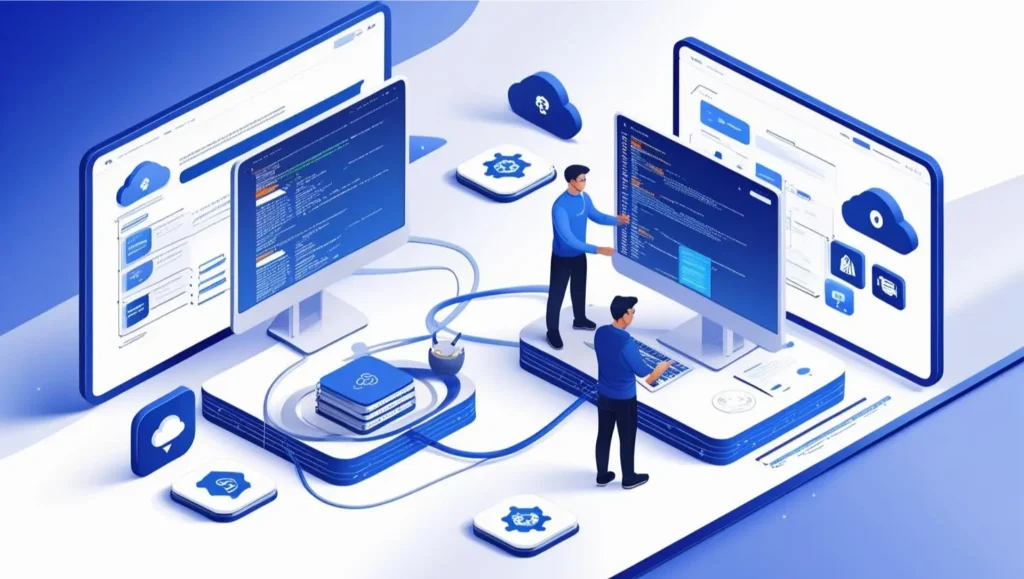Custom software development involves the entire process from crafting software designed specifically for an organization’s individual needs, through its deployment and maintenance. Custom applications are naturally tailored to specific types of businesses or groups, working at the level of business processes or workflows, business goals, regulatory regime obligations, and so on.
This guide has everything you need to know – processes, benefits, use cases, outsourcing models, industry-specific applications, and FAQs – to meet enterprise or startup needs in a place where you need it no more than once.
What Is Custom Software Development?
Custom software development involves creating tailored digital solutions to meet an organization’s needs exactly. These solutions are built using state-of-the-art technologies and are easy to adapt as a company’s business model changes.
Key characteristics:
- Built from scratch or by modifying existing frameworks.
- Offers full ownership, scalability, and long-term ROI.
- Helps differentiate from competitors through unique capabilities.
Benefits of Custom Software Development
1. Tailored to Business Needs
Custom solutions are designed specifically for your workflows, reducing friction and manual intervention.
2. Scalability and Flexibility
As your company grows, your custom system can evolve. Updates and modules can be added as needed.
3. Competitive Advantage
With proprietary features and better process integration, your company gains a distinct market edge.
4. Better Integration
Custom software connects with your existing infrastructure—ERPs, CRMs, third-party APIs—with ease.
5. Enhanced Security
Security features are built-in, especially critical for industries like healthcare, finance, and logistics.
The Custom Software Development Process
Step 1: Discovery & Requirement Analysis
- Stakeholder interviews
- Business process mapping
- Technical audit
- Compliance assessment
Step 2: Design & Architecture
- UI/UX design
- Systems architecture planning
- Technology stack selection
Step 3: Development & Testing
- Agile sprint-based coding
- Automated testing
- Continuous Integration / Continuous Deployment (CI/CD)
Step 4: Deployment & Integration
- Cloud or on-prem deployment
- Integration with third-party tools
- Training & documentation
Step 5: Support & Maintenance
- Bug fixes
- Performance optimization
- Feature enhancements
Custom Software Development Services
A top-tier custom software development company provides:
- Web & mobile app development
- Cloud-native development
- API & third-party integration
- Software modernization
- Maintenance & support
- DevOps automation
Some companies also specialize in domain-specific services, such as:
- Custom healthcare software development company: HIPAA-compliant EHRs, patient portals, telehealth.
- Custom financial software development: Secure banking apps, trading platforms, fraud detection systems.
- Custom logistics software development: TMS, WMS, route optimization, real-time fleet tracking.
- Custom retail software development: POS systems, customer analytics, supply chain tools.
- Custom real estate software development: CRMs, property portals, leasing software, virtual tour tools.

Outsourcing Custom Software Development
Outsourcing is a cost-effective and efficient way to build custom software when you lack internal resources.
Benefits:
- Access to skilled global talent
- Reduced development time
- Lower operational costs
- Scalability of team size
What to Look for in an Outsourcing Partner:
- Domain expertise (e.g., healthcare, fintech)
- Proven case studies
- Agile methodology
- Transparency in pricing and process
- Strong communication and collaboration tools
When to Choose Custom Over Off-the-Shelf Solutions
| Criteria | Custom Software | Off-the-Shelf |
| Scalability | High | Limited |
| Integration | Seamless with legacy systems | Often challenging |
| Cost | Higher upfront, lower long-term | Lower upfront, costly upgrades |
| Unique Features | Fully customizable | Predefined and rigid |
| Ownership | Full | Vendor-controlled |
Use Cases by Industry
Healthcare
- Telehealth solutions
- EHR systems
- Remote patient monitoring
Finance
- Payment gateways
- Banking apps
- Compliance auditing tools
Logistics
- Inventory and warehouse management
- Fleet tracking dashboards
Retail
- Omnichannel eCommerce platforms
- Loyalty programs
- Predictive analytics
Real Estate
- Virtual property showings
- Tenant portals
- AI-driven property evaluations
Challenges in Custom Software Development
- High upfront cost: Requires strategic investment planning.
- Time to market: Takes longer than plug-and-play solutions.
- Vendor dependency: Requires a long-term development partner.
- Change management: Internal resistance to new systems.
How to Choose the Right Custom Software Development Company
- Look for companies with strong E-E-A-T: proven expertise, thought leadership, and trust signals.
- Verify industry certifications (ISO, HIPAA, PCI DSS).
- Review testimonials and case studies.
- Ask about tech stack and software delivery models.
- Ensure post-launch support is included.
Conclusion:
Investing in custom software development ensures that your digital tools grow with your business, adapt to market demands, and offer a level of personalization no off-the-shelf product can. Whether you’re a startup seeking an MVP or a large enterprise with intricate systems, a reliable custom software development company can deliver tailored, secure, and scalable solutions.
From custom healthcare software development to custom logistics software development, the value lies in innovation, control, and optimization. As industries become more tech-driven, custom solutions become not just an advantage but a necessity.
FAQs About Custom Software Development
Q1: How long does custom software development take?
A: It depends on complexity. Small apps may take 2–3 months, while enterprise solutions may span 6–12+ months.
Q2: Is custom software more expensive?
A: While it has higher upfront costs, it provides better ROI, scalability, and integration long-term.
Q3: Can I outsource just part of the development?
A: Yes. Many businesses outsource backend development, QA, or UI/UX while managing other parts internally.
Q4: What technologies are commonly used?
A: JavaScript, Python, Java, .NET, React, Angular, Node.js, AWS, Azure, Kubernetes, and Docker.
Q5: Is custom software secure?
A: Yes, when developed by professionals using secure coding practices, compliance standards, and proper testing.
Q6: What industries benefit most?
A: Healthcare, finance, logistics, retail, real estate, and manufacturing due to complex workflows and compliance needs.

